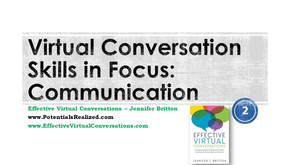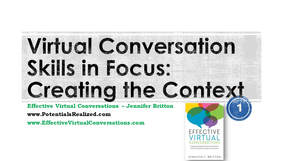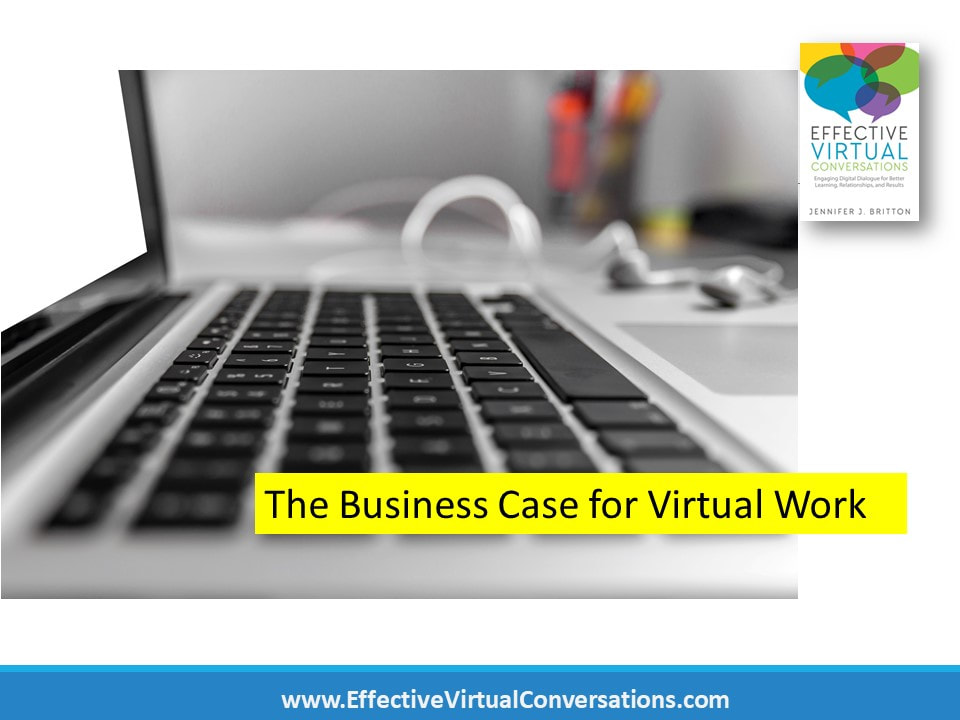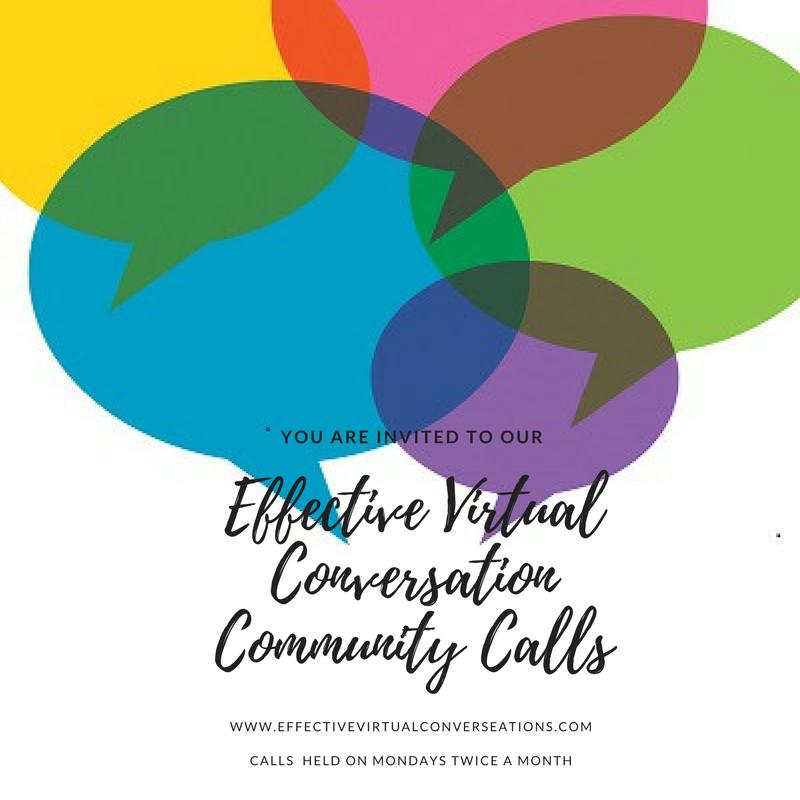 Last week here at the blog I shared the first of eight skill areas which are important in virtual facilitation - Setting the Context. Today we look at another Skill area - Communication. At the heart of great conversations is this skill set which I break down to:
Let's look briefly at each one (and a reminder that I go into much greater depth in chapter 3 of EVC): Listening: Depending on the type of virtual conversation platform we are using listening can be enhanced or deepened by other senses - such as seeing when we are on a streaming call. Listening is a skill set which may not be as well developed. Communication is not only what is being said but how we interpret it. How are you listening? Here are some questions to consider from my Teams365 blog: As you consider your own listening skills right now, reflect on these questions:
Inquiry and Reflection - The Fifth Discipline Fieldbook notes "Two types of skill are central to this work: they are reflection (slowing down our thinking processes to become more aware of how we form our mental models) and inquiry (holding conversations where we openly share views and develop knowledge about each other's assumptions)" (pp 77, Senge et al) What are you doing to build in inquiry and reflection into your design - for example - not trying to fit too much into calls or Reading the environment - When you spend time in the virtual space you begin to notice the energy of a call. Some feel as if the air has been sucked out while others pass like the blink of an eye. As we'll see in other posts (and throughout the book) masterful virtual facilitators "read the room" and are adept at using questions, and pace changes, to adjust. Questioning - Questions form the backbone to any great conversation, and in the arena of communication questions are a virtual facilitators ally. Key things to keep in mind: Use open ended questions (starting with What) to invite people into the conversation Be aware that HOW questions will Keep them short - 5-7 words only Watch how many questions you are asking at once. More than one or two and you may notice the silence on the other side which could indicate - what are they asking? Avoid Why questions until there are high levels of trust. Why questions often put people on the defense. Pace and Pitch - the final area I wanted to touch on in this post is getting you to think about the pace you want to set in your virtual call. Consider the individuals you are working wtih. Are they quick paced? Do they appreciate a reflective pause? How are you using silence to allow people to think, and reflect? What are you doing to change the way people engage - i.e. using visuals or breakouts or annotation. I cover many of these questions in community calls, as well as my monthly newsletter for Effective Virtual Conversation enthusiasts. Consider: What's the best pace and pitch for this group? Over the next month or two I’ll be exploring some of the many skills housed in these eight areas. For more on this you may want to check out my January 2018 Community Call, as well as Chapter 3 of Effective Virtual Conversations where I explore these skills more in-depth. Out of the five skills I have highlighted today, which ones are your strengths? What can you do to leverage these more? Which one would you like to put more attention around? Have a great week, Jennifer Jennifer Britton Potentials Realized | Coaching Team Leaders Team and Leadership Development | Coaching | Retreats. Follow us on Twitter @jennbritton (coaching/facilitation) @Teams365 (leadership) Phone: (416)996-8326 Looking to enhance your virtual conversations - Conference calls? Webinars? Virtual coaching work? Pick up a copy of my new book, Effective Virtual Conversations, at Amazon. Great news! The Virtual Facilitation Essentials program has been reviewed and approved by the International Coach Federation for 8.5 hours of Continuing Coach Education (5.5 hours core competencies). Looking to boost your virtual skills and want a booster around the basics? Join us for this 5 week interactive webinar learning experience. The next group starts Friday February 16th at 1:15 pm ET (calls are 5 Fridays from 1:15-2:30 pm Eastern/Toronto) For Coaches: The Coaching Biz Growth Lab - a three month group focused on your coaching business growth. We'll be kicking off on February 1st at 3 pm ET for 7 calls over the three months. Other groups will start Spring and Summer 2018.
0 Comments
 The virtual realm is hosting such a wide variety of conversations today. From coaching to mentoring to performance management and leadership conversations. Now that creates opportunity but it also creates some interesting nuances for those of us stepping into this work. What are the skills which support a great virtual conversation. In my latest book, Effective Virtual Conversations, I highlight eight skill areas will put you in the arena or the neighborhood of more masterful virtual conversations. Like anything we need to practice these skills. It’s like a muscle – if we are not using them, it’s easy to lose the skills. Over the next month or two I’ll be exploring some of the many skills housed in these eight areas. For more on this you may want to check out my January 2018 Community Call, as well as Chapter 3 of Effective Virtual Conversations where I explore these skills more in-depth. As you step into the new year think about what opportunities you have to keep these skills alive and growing. Just like any skill set, we get better with practice – more fluid in working the technology, more confident in “asking the right question” (although is the ever one right question?). The skills of a masterful virtual facilitator range from communication, to technical skills to process skills. Today’s blog post is going to explore one area – that being Creating the Context. I liken a great virtual facilitator to being a great host – welcoming people into the conversation. One of the first questions we want to be asking is “how do we create a safe and engaging conversations space?: Some of the key elements are that we need to have trust, safety and connection. Creating shared expectations is another part of creating the context and the space for a great virtual conversation. Why are we here? What’s important for us to explore in this conversation? What are we wanting to achieve as an outcome from this? Another piece of creating the context is Managing the Process. What approaches and tools does the virtual facilitator have to keep the conversation “on track”? To help the group make decisions? To help the team create an action plan. In creating the context for a virtual conversation, virtual facilitators will want to think about questions like:
Next week, I’ll be back to explore different communication skills masterful virtual facilitators bring. Have a great week, Jennifer Jennifer Britton Potentials Realized | Coaching Team Leaders Team and Leadership Development | Coaching | Retreats. Follow us on Twitter @jennbritton (coaching/facilitation) @Teams365 (leadership) Phone: (416)996-8326 Looking to enhance your virtual conversations - Conference calls? Webinars? Virtual coaching work? Pick up a copy of my new book, Effective Virtual Conversations, at Amazon. New in 2018 - The Teams365 Leadership Lab - an annual group for leaders which meets every two weeks throughout 2018. We'll be exploring topics like Emotional Intelligence, Team Management, Coaching Skills. We'll be kicking off on January 26th at 845 am ET online. Download the call schedule here. For Coaches: The Coaching Biz Growth Lab - a three month group focused on your coaching business growth. We'll be kicking off on February 1st at 3 pm ET for 7 calls over the three months. With the temperatures here in Toronto dipping into record-breaking territory last week, and several planes grounded one day, I was reminded of why I shifted to a work flow several years ago which has me office based and working virtually outside of the summer months and what I term shoulder seasons (September/October, and April/May). Having had extensive local, regional and global travel as part of my own work portfolio for more than a decade, I am impatient when it comes to my time getting impacted by travel disruption. My own professional travel fatigue, along with wanting to continue my own global connections and work, is what led me to much of my own early full-time virtual work back in 2004. Today it's the way I do things and the way our business is established. Every day I see more and more businesses dipping their toes into the virtual space, innovating to make it work. And innovation is the key term here, we can't just transplant "old ways of working, leading and conversing" expecting a different result in the virtual space. This year I am committed to sharing at least two blog posts a month. Some may be an excerpt from my recent book, Effective Virtual Conversations, and others may be new content and pointers to examples of how companies and teams are making virtual work for them. This is in addition to the monthly Effective Virtual Conversations calls I will be hosting into this new year. Next on scheduled for January 15th at 11 am ET - stay tuned at our Facebook page (Effective Group Coaching) for more info. Today's post is an excerpt from Effective Virtual Conversations about the business case for virtual. Here's what I write on pages 7 and 8 of the book: The Business Case For Virtual (Excerpt from Effective Virtual Conversations - pgs 7 and 8 Copyright 2017, Jennifer Britton, All Rights Reserved) "There are many reasons why it is important to take a look at virtual conversations, teamwork and learning, namely: The Move to Just-in-Time or Real Time Processes - We live in an era of immediate gratification. Recent research points to the "Uber effect," which is the ability to acquire anything real time or just-in-time. This is changing the landscape of what is seen as "effective" in the learning space by professionals. Learners and other professionals are asking, "If I need it now, why shouldn't I be able to get it or access it right away?" On-demand and mobile platforms offer this real-time learning. Internet-based work allows for us to connect and work real-time, no longer necessitating long travel or delays in our collaborative spaces. Time Efficiency -Virtual approaches provide many benefits in terms of time and budget. They provide a reduction in the amount of time people need to spend away from the office to engage in learning. Why travel if you don't have to? Reduction of the Carbon Footprint (Eco-Friendliness) - Britain's Open University found that e-learning consumes 90% less energy than traditional courses. They found that the amount of CO2 emissions (per student) is also reduced by up to 85%.[i] Bringing Expertise Together - Virtual conversations and learning allow you to collaborate and learn from the best across time differences. These peer partnerships span geographic boundaries, changing the way we see the world, how we share information and what we create. Bringing Peers Together from a Wider Cross-Section - The virtual space allows us to connect people from around the world in similar passions. With Zoom and other video-streaming meeting services, virtual meetings sometimes feel as if we are across the table from each other in terms of our ability to see each other and engage in real-time conversation. Real-time Learning - With the advent of mobile technologies, smart devices bring conversations and learning to us immediately-from the office to commuting, our phones have created a new window to the conversation and learning ecosystem. Why Virtual Learning? Many companies are leveraging virtual learning for a number of reasons including:
What do you see as the compelling business, and human, reasons for moving to more virtual and/or remote work relationships? Share them with us in the comments section. You can pick up a copy of Effective Virtual Conversations at Amazon or our site. Have a great week, Jennifer Jennifer Britton Potentials Realized | GroupCoachingEssentials.com Author of Effective Group Coaching, From One to Many: Best Practices for Team and Group Coaching and Effective Virtual Conversations Email: info@potentialsrealized.com Facebook: EffectiveGroupCoaching Innovation is the key term here, we can't just transplant "old ways of working, leading and conversing" expecting a different result in the virtual space. " - Jennifer Britton, Effective Virtual Conversations blog post 1/9/18 |
AuthorJoin Effective Virtual Conversations Author Jennifer Britton for regular posts to spark your ideas and conversations virtually! Jennifer is the author of five books including her latest PlanDoTrack. Upcoming Programs Virtual Facilitation Essentials: (8.5 CCEs with ICF) Mondays 1:30 - 245 pm ET:May 4, 11, 18, June 1 and 8 (8.5 CCEs) - Virtual
OR participate in a 1 day offering. Upcoming dates include Wednesday April 29 OR May 6 (9 - 430 pm ET) Group Coaching Essentials (8.75 CCEs); Fridays 10 - 1115 am ET: April 24, May 1, 8, 15 and 22,2020 (Virtual - by zoom) PlanDoTrack Facilitator Training - Join our list of those interested in participating in the next 3 day virtual offering - Mid-May to June Learning Lab and Design Studio meets throughout the year on Fridays from 8:45 -930 am ET (Weeks 1 and 3 of month). Join us for a month or the year. October's focus is on team coaching. Coaching Biz Growth Lab - Business Group Coaching for Coaching Business Owners - Meets Week 1 and 3 Fridays of Each Month (3-4 pm ET). Archives
July 2020
Categories
All
|

 RSS Feed
RSS Feed
